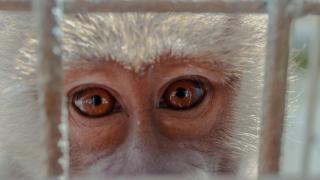
Sign-up to support our global work
We welcome the small decrease in the number of animals used in experiments in Canada in 2022 – but are shocked and disappointed by the significant increases in the use of monkeys and dogs.
The use of monkeys rose by 15% from 2021, to 7,848, and dogs by 4%, to 10,417, in the annual total of 3,521,143 animals used.
There were also significant increases in the numbers of pigs (37%), reptiles (35%), “other animals” (e.g. ferrets) (28%), cattle (14%) and rats (7%) used in experiments in 2022. The largest decreases were seen in the use of birds (down 64%) and cats (down 28%).
These official figures were released by the Canadian Council on Animal Care (CCAC). However, the true totals are likely to be higher, as the CCAC figures only include data supplied by accredited organizations. Not all Canadian institutions participate in the CCAC’s voluntary program.
Only 5% of experiments conducted on animals were required by regulators testing the safety and efficacy of products. A further 58% were for basic research purposes, and 8% for education and training – a sector in which there was a 121% increase during 2022.
Over 105,000 animals (2.8% of the total) were used in experiments classified as causing the most “severe pain near, at, or above the pain tolerance threshold of unanesthetized conscious animals”. Of those, a surprisingly high total of 50% were used for regulatory tests, with 30% used for basic research purposes.
In 2015, we estimated Canada to be the fourth biggest user of animals in scientific research in the world, behind only China, Japan and the United States of America. Those estimates also calculated Canada to be the third biggest user of dogs and the fifth biggest user of monkeys.
Our Head of Public Affairs North America, Monica Engebretson, said, “Far more needs to be done to end the cruel use of animals in research and testing. We had hoped to see a much larger decrease in the number of animals used, when public demand for humane science, and the development of non-animal testing methods, are both increasing.
“These figures highlight the need for other sectors to follow the lead of the Canadian cosmetics industry which broadly supported the passage of the Canadian government’s ban on animal testing for new products and ingredients, which comes into effect on December 22. There was overwhelming support from the public, politicians, and companies for the legislation and we now need this ethos of collaboration, innovation, and commitment to be adopted by other industries and sectors.”
Sign up for urgent campaign alerts to be the first to hear about how you can support an end to animal testing:
